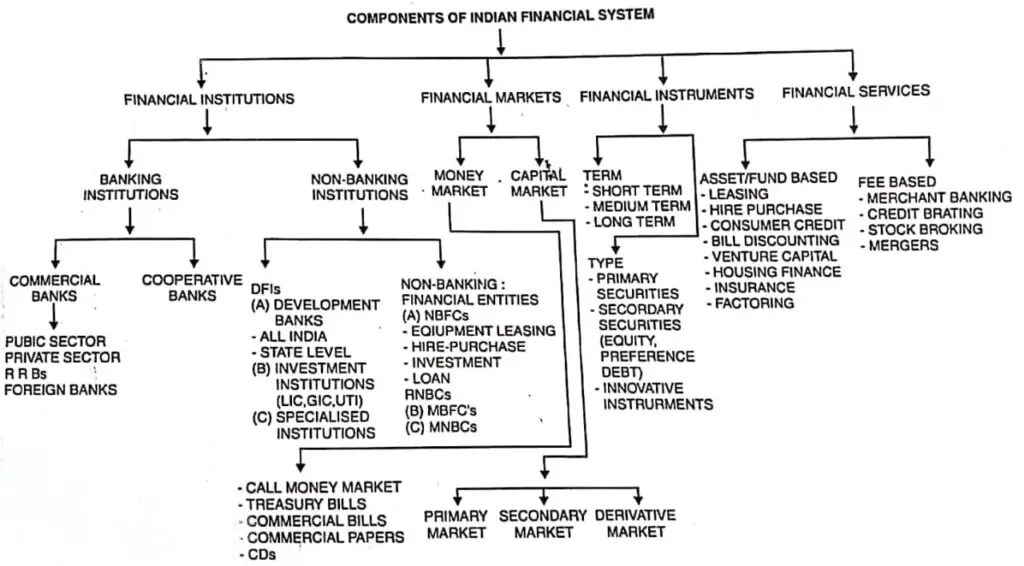Contents
Meaning of Indian Financial System
The financial system is the main part of running the economy smoothly. financial system provides the flow of finance in the economy. which leads to the development of the country financial system show the strength of the country.
Indian Financial System is a combination of financial institutions, financial markets, financial instruments and financial services to facilitate the transfer of funds. Financial system provides a payment mechanism for the exchange of goods and services. It is a link between saver and investor.

Structure of Indian Financial System
The following are the four major components that comprise the Indian Financial System:
- Financial Institutions
- Financial Markets
- Financial Instruments/Assets/Securities
- Financial Services.
Financial Institutions
Financial institutions are the intermediaries who facilitate the smooth functioning of the financial system by making investors and borrowers meet. They mobilize savings of the surplus units and allocate them in productive activities promising a better rate of return. Structure of Indian Financial System also provides services to entities (individual, business, government) seeking advice on various issues ranging from restructuring to diversification plans. They provide whole range Of services to the entities who want to raise funds from the markets or elsewhere. The financial Institutions is very important for the function of a financial system
Types of Financial Institutions
Financial institutions can be classified into two categories
- Banking Institutions
- Non-Banking Financial Institutions
Financial Markets
Financial markets may be broadly classified as negotiated loan markets and open The negotiated loan market is a market in which the lender and the borrower personally negotiate the terms of the loan agreement, e.g. a businessman borrowing from a bank or from a small loan company. On the other hand, the open market is an impersonal market in which standardized securities are treated in large volumes. The stock market is an example of an open market. The financial markets, in a nutshell, the credit markets catering to the various credit needs Of the individuals, links and institutions. Credit is supplied both on a short as well as a long
On the basis of the credit requirement for short-term and long term purposes, financial markets are divided into two categories
Types of the financial market
- Money Market
- Capital Market
Financial Instruments/ Assets/ Securities
This is an important component of the financial system. Financial instruments are monetary contracts between parties. The products which are traded in a financial market are financial assets, securities or other types of financial instruments. There is a wide range of securities in the markets since the needs of investors and credit seekers are different. Financial instruments can be real or virtual documents representing a legal agreement involving any kind of monetary value. Equity-based financial instruments represent ownership of an asset. Debt-based financial instruments represent a loan made by an investor to the owner of the asset.
Types of Financial Instruments
- Cash Instruments
- Derivative Instrument
Financial Services
It consists of services provided by Asset Management and Liability Management Companies. They help to get the required funds and also make sure that they are efficiently invested. They assist to determine the financing combination and extend their professional services up to the stage of servicing of lenders.
Types of Financial Services
- Banking
- Wealth Management
- Mutual Funds
- Insurance
The Structure of Indian Financial System is about A financial system is a system that system which allows the exchange of funds between investors, lenders, and borrowers. Indian Financial systems operate at national and global levels. They consist of complex, closely related services, markets, and institutions intended to provide an efficient and regular linkage between investors and depositors.
Also Read
Structure of Indian Financial Market
Structure of Indian Financial System PDF
Presentation
Also, Read
Characteristics of Indian Financial System